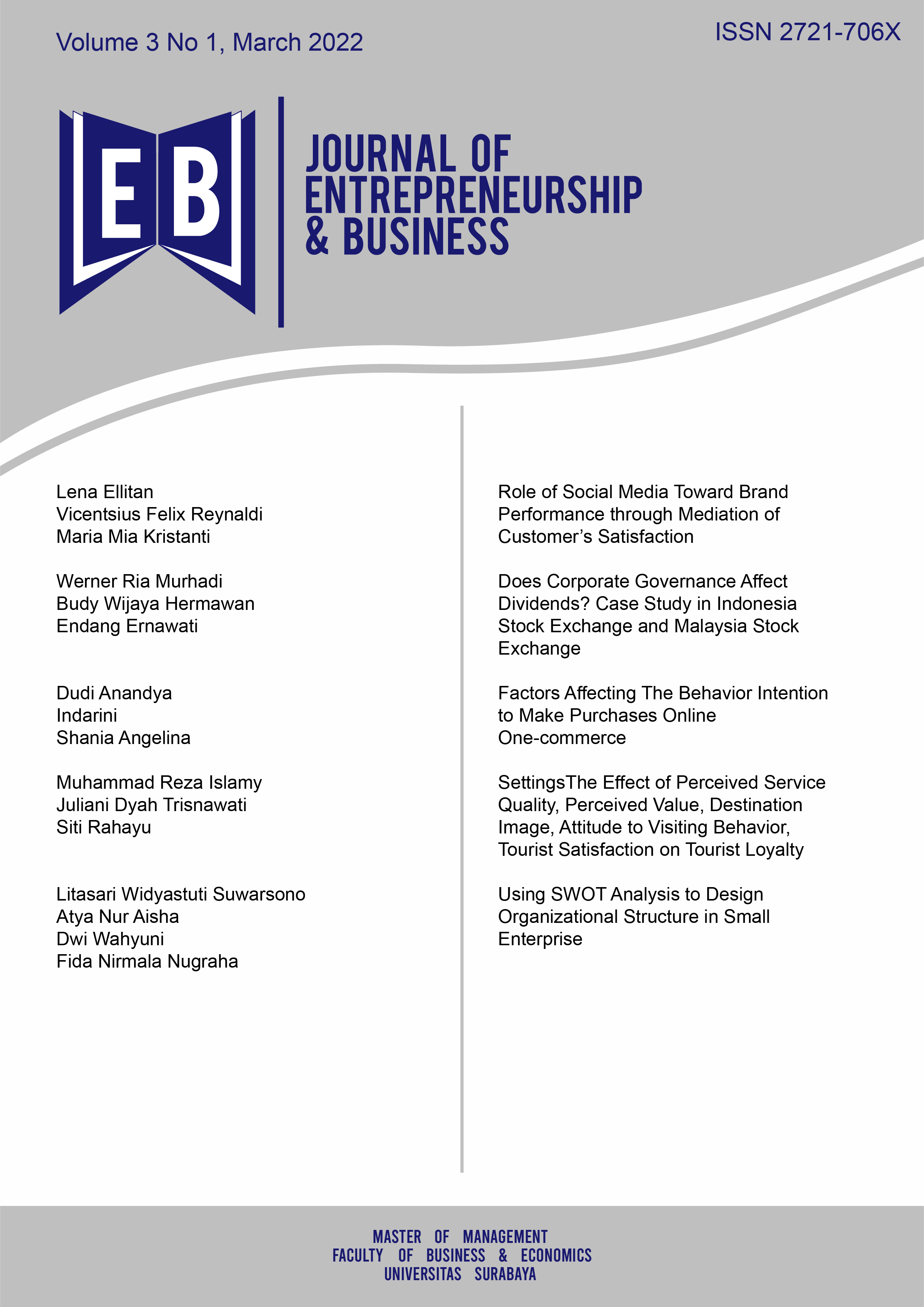Factors affecting the Behavior Intention to Make Purchases Online On E-Commerce
 Abstract Views:
1186 times
Abstract Views:
1186 times
 PDF Downloads:
1213 times
PDF Downloads:
1213 times
Abstract
This study aims to determine and analyze the factors that influence behavioral intentions to make purchases online with the object of research e-commerce. The focus of this research are performance expectancy, effort expectancy, social influence, anxiety, personal innovativeness, and behavioral intention to purchase online. Sources of data obtained by distributing online questionnaires. Data were collected through questionnaires distributed to 398 respondents an then analyzed using path analysis and MGA (Multigroup Analysis) with SPSS (Statistical Package for Social Sciences) and SmartPLS 3.0 software. The results showed that performance expectancy, effort expectancy, social influence, and personal innovativeness had a positive and significant influence on behavioral intention to purchase online for the entire group, but there was no difference in the effect between the two gender groups. On the other hand, anxiety has a negative and significant influence on behavioral intention to purchase online in both gender groups and has a significant difference in influence which is dominated by the female group compared to the male group.
Downloads
References
Çelik, Hakan, (2011), Influence of social norms, perceived playfulness, and online shopping anxiety on customers' adoption of online retail shopping, International Journal of Retail & Distribution Management, Vol 39 (6): 390-413. https://doi.org/10.1108/09590551111137967
Celik, H. (2016), Customer online shopping anxiety within the Unified Theory of Acceptance and Use Technology (UTAUT) framework, Asia Pacific Journal of Marketing and Logistics, Vol 28 (2). https://doi.org/10.1108/APJML-05-2015-0077
Dewi, C. K., Mohaidin, Z., & Murshid, M. A. (2019), Determinants of online purchase intention: a PLS-SEM approach: evidence from Indonesia, Journal of Asia Business Studies, Vol 14(3): 281-306. https://doi.org/10.1108/JABS-03-2019-0086.
Fard, Saeideh Sharifi, Ezhar Tamam, Md Salleh Hj Hassan, Moniza Waheed, Zeinab Zaremohzzabieh (2016). Factors affecting Malaysian university students’ purchase intention in social networking sites. Cogent Business & Management. Vol 3(1): 1182612.
Ha, Y. and Im, H. (2014), Determinants of mobile coupon service adoption: assessment of
gender difference, International Journal of Retail & Distribution Management, Vol. 42 (5): 441–459.
Hair, Joseph F., Black, William C., Babin, Barry J., Anderson, & Rolph E. (2014). Multivariate Data Analysis. 7th ed. United Kingdom: Pearson Education Limited.
Kim, J., & Park, J, (2005), A consumer shopping channel extension model: attitude shift toward the online store, Journal of Fashion Marketing and Management: An International Journal, Vol 9(1):106-121.
Lian, Jiunn-Woei (Allen), & David, C. Yen, (2014), Online shopping drivers and barriers for older adults: Age and gender differences, Computers in Human Behavior, 37: 133-143.
Makhitha, Mercy & Nobukhosi Dlodlo, (2014), Examining Salient Dimensions of Online Shopping and the Moderating Influence of Gender: The Case of Students at a South African University, Mediterranean Journal of Social Sciences, Vol 5 (23): 1838- 1848.
Rodriguez T. Escobar & Carvajal-Trujillo, (2014), Online purchasing tickets for low cost carriers: An application of the unified theory of acceptance and use of technology (UTAUT) model, Tourism management, Vol 43 (August): 70-88.
Sair, Shrafat Ali, Danish, Rizwan Qaisar, (2018), Effect of performance expectancy and effort expectancy on the mobile commerce adoption intention through personal innovativeness among Pakistani consumers, Pakistan Journal of Commerce and Social Sciences (PJCSS), Vol. 12, (2):501-520.
San Martin, Héctor, & Angel Herrero. (2012), Influence of the user’s psychological factors on the online purchase intention in rural tourism: Integrating innovativeness to the UTAUT framework, Tourism Management, Vol 33(2):341-350.
Thakur, R. and Srivastava, M. (2015), “A study on the impact of consumer risk perception and innovativeness on online shopping in India”, International Journal of Retail & Distribution Management,Vol. 43 (2): 148-166.
Venkatesh, V., Morris, M. G., Davis, G. B., & Davis, F. D. (2003), User acceptance of information technology: Toward a unified view, MIS quarterly, Vol 27(3): 425-478. https://doi.org/10.2307/30036540
Wang, Hao, John D. Nagy, Olivier Gilg, Yang Kuang, (2009), The roles of predator maturation delay and functional response in determining the periodicity of predator–prey cycles, Mathematical Biosciences, Vol 221: 1-10.

This work is licensed under a Creative Commons Attribution 4.0 International License.
Articles published in Journal of Entrepreneurship & Business are licensed under a Creative Commons Attribution 4.0 International (CC BY) license. You are free to copy, transform, or redistribute articles for any lawful purpose in any medium, provided you give appropriate credit to the original author(s) and the journal, link to the license, and indicate if changes were made.
Authors submitting to this journal agree to make their work freely available under the CC BY 4.0 license, ensuring broad dissemination and reuse. The full license details can be accessed at https://creativecommons.org/licenses/by/4.0/.
This ensures that they receive the maximum dissemination because there are no barriers to access. This license allows readers to disseminate and reuse the paper, but always requires them to grant the authors and the first publication full credit.
While JEB upholds ethical publishing standards, the responsibility for ensuring originality and compliance with copyright regulations lies with the authors. The journal is not liable for any legal claims related to the content of published articles.
For further inquiries, please contact the editorial team.

 DOI:
DOI:











